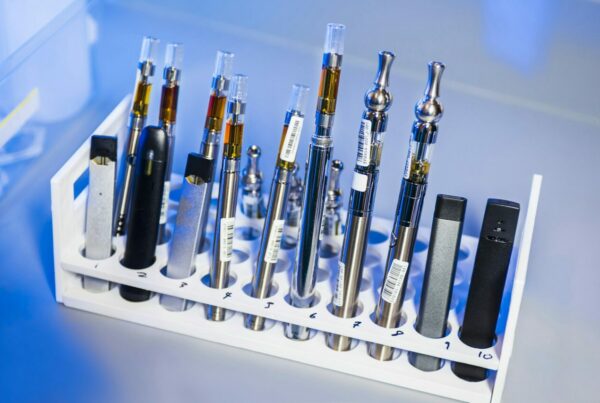N, N-Dimethyltryptamine (DMT) is a compound generally found in both flora and fauna, acknowledged for its brief yet potent psychedelic effects when ingested.
Emerging evidence implies that DMT, naturally present in the human body, plays crucial roles in both the peripheral and central nervous systems and might act as a neurotransmitter.
DMT can trigger powerful psychedelic experiences, yet it typically doesn’t result in numerous adverse effects, save for possible cardiovascular complications when administered in high doses via injection.
Let’s explore DMT and its diverse roles, ranging from recreational use to its promising potential in scientific exploration and therapeutic applications.

A Brief Introduction to DMT: What is it?
| Characteristic | Explanation |
| Name | N, N-Dimethyltryptamine (DMT) |
| Type | Indole alkaloid |
| Presence | Naturally found in a variety of plants and animals |
| Psychoactive Effects | Brief, intense psychedelic experiences upon consumption. |
| Method of Administration | Can be inhaled, injected, or ingested orally. |
| Duration of Impact | Short-lived, typically lasting from 5 to 30 minutes. |
| Chemical Structure | Comprises a tryptamine core with two methyl groups attached to the amine nitrogen atom. |
| Metabolism | Rapidly metabolized by the body, processed by monoamine oxidase (MAO). |
| Cultural Usage | Historically used in various ceremonial and shamanic rituals in indigenous cultures. |
| Alternative Names | Dimitrifantasia, businessman’s trip, Businessman’s special, 45-minute psychosis, spiritual molecule |
The Role of DMT in Mental Health
N, N-Dimethyltryptamine (DMT), a compound known for its powerful psychedelic effects, is gaining attention for its potential benefits to mental health. Despite its conventional reputation for inducing intense visionary experiences, recent research suggests a connection between DMT and mental wellness.
Effect on Psychological and Emotional Well-being
The psychedelic effects of DMT are notorious for eliciting deep emotional reactions and altering consciousness states. This has the potential to pave the way for therapeutic methods to address mental health problems, aid in emotional processing, and provide new perspectives on personal traumas.
Neuroplasticity and Brain Function
Research suggests that DMT may influence neuroplasticity, thus enhancing the brain’s ability to adapt and reorganize. Understanding its impact on synaptic plasticity and neural connectivity could provide potential treatments for conditions associated with neural imbalances.
Potential Therapeutic Use for Mental Health Disorders
Initial studies underscore DMT’s potential in treating conditions such as depression, addiction, and PTSD. Its ability to induce mystical or spiritual experiences may offer a novel approach to psychotherapy and aid in restructuring negative thought processes.
Investigating the natural presence of DMT within the body reveals its significance in promoting mental health resilience, managing stress responses, and fostering overall psychological well-being. Understanding how the body controls internal DMT levels could lead to the development of new therapeutic strategies.
DMT and Mental Health Disorders
| Mental Health Disorder | Description | DMT’s Potential Effectiveness | Potential Benefits |
| Depression | A mood disorder characterized by persistent sadness, disinterest, and reduced motivation | DMT may alleviate symptoms according to initial research, by inducing profound emotional experiences. | Its rapid onset and ability to instigate transformative experiences could present innovative therapeutic approaches for reshaping negative thought patterns and enhancing emotional processing |
| Post-Traumatic Stress Disorder (PTSD) | A mental health disorder resulting from traumatic events, causing flashbacks, intense anxiety, and intrusive thoughts | DMT may help manage symptoms according to preliminary research, by triggering spiritual or mystical experiences that could help patients reframe traumatic memories | The potential of DMT to induce altered states of consciousness may assist in emotional processing and provide a fresh perspective on traumatic experiences |
| Addiction | A complex disorder characterized by compulsive engagement in rewarding stimuli despite adverse consequences | DMT may play a role in breaking addictive patterns and reducing substance cravings, as suggested by some studies | DMT’s ability to induce profound and transformative experiences may assist individuals in altering their behavioural patterns and addressing the root causes of their addiction |
Approaches to Utilizing DMT
DMT, renowned for triggering short yet powerful psychedelic experiences, can be administered in a variety of ways. The chosen method often hinges on the desired intensity and duration of the psychedelic journey.
Inhalation:
DMT, when inhaled through a pipe or vaporizer, necessitates precise temperature control to avert overheating and combustion of the compound. The psychedelic effects manifest almost instantly when DMT is inhaled, usually enduring between 5 to 15 minutes.
Oral Consumption:
Consuming DMT orally leads to a slower onset of effects that persist considerably longer, often for several hours. This is a result of the gradual breakdown of DMT when mixed with an MAOI.
Injection:
DMT can be directly injected into the bloodstream for quick and powerful effects.
This method triggers an immediate and intense experience, but it demands precise dosage and carries greater risks.
Insufflation (Snorting):
Snorting DMT results in a slower onset of effects compared to inhalation but could potentially provide a more prolonged experience.
Sublingual or Buccal Administration:
When DMT is absorbed via the oral mucosa, this method presents an alternative to inhalation and offers a more extended, though less intense, experience.
Determining Therapeutic Dosage: N, N-Dimethyltryptamine (DMT)
For inhalation, the proposed dosage is between 20 to 40 mg, while for intravenous administration, the suggested dosage is 0.2 to 0.4 mg per kg of body weight. These dosage recommendations are primarily relevant to clinical research, particularly for intravenous administration.
- Higher doses given intravenously are associated with intense visuals, temporary loss of control, and a combined state of anxiety and euphoria
- Remarkably, lower doses have demonstrated less favorable effects
- Recreational doses of inhaled DMT typically range from 40 to 50 mg, sometimes even escalating to 100 mg
- Various doses of intravenous DMT (in 7, 14, 18, and 20 mg solutions) linked to near-death experiences has been reported to foster positive and enduring enhancements in psychological health.
Availability of DMT
ProductsOsmosis – Tincture of 4-ACO-DMT Ethereal Essence
This tincture claims to contain 4-Acetoxy-N, N-dimethyltryptamine (4-AcO-DMT), a DMT variant. Tinctures, liquid extracts for oral use, can offer a unique experience compared to traditional DMT.
Lucid Supply Co. – Vaporizer of 5-MeO DMT
This product is a vaporizer containing 5-Methoxy-N, N-dimethyltryptamine (5-MeO-DMT). This compound, known for its potent and transformative but often brief experiences, is the active ingredient.
Integral Alchemist – Acacia – 1ml Cartridge for DMT Vaping
Integral Alchemist’s DMT vape cartridge, pre-filled with N, N-Dimethyltryptamine, is likely aimed at those who favour a discreet and convenient method of DMT administration.
Deadhead Chemist – Cartridge of 5-Meo-DMT
This cartridge houses 5-Methoxy-N, N-dimethyltryptamine (5-MeO-DMT), a substance known for its deep and powerful effects.
Possible mental health benefits might be tied to personal growth, spiritual experiences, or therapeutic applications designed to enhance emotional well-being.
Deadhead Chemist – Cartridge of N, N DMT
Another offering from Deadhead Chemist, this cartridge has the traditional N, N-Dimethyltryptamine. Cartridges present a straightforward way to consume DMT, providing a more consistent and regulated experience.
Concluding Remarks
The application of N, N-Dimethyltryptamine (DMT) in
How can DMT impact mental health?
The journey through mental health therapy can be both exhilarating and complex. The ability of the compound to induce potent but brief psychedelic experiences opens up new potential therapeutic approaches.
Early studies indicate its prospective function in emotional processing, personal evolution, and potentially
The profound influence of mental health therapy requires careful examination and prudent utilization.
For those considering the responsible exploration of DMT products, reliable sources like the Magic Mushrooms Online Canada Online Dispensary are available to offer advice and supply a variety of choices.
Frequently Asked Questions:
How do different DMT products affect mental health?
For instance, vaporizers may lead to rapid effects, while tinctures or vape cartridges might provide more stable and predictable dosages.
Incorporating derivative compounds or 5-MeO-DMT can result in varying intensity levels and distinct mental health effects.
These minor differences underscore the importance of selecting a DMT product based on individual preferences and mental health goals.
Can DMT assist in long-term mental health improvements and personal growth?
There is anecdotal evidence to suggest that DMT-induced experiences could have enduring effects on mental health and personal advancement.
Experiences that are deeply influential or transformative, such as those resembling near-death situations, are often associated with continuous positive changes in mental wellbeing and personal development.
Despite these experiences being powerful and transient, they frequently lead to introspection, spiritual revelations, and a sense of unity or enlightenment.
Following these experiences, people often express a refreshed perspective on life, improved emotional resilience, and a heightened gratitude for existence.
What is the most effective method to use DMT for mental health?
It’s essential to make educated decisions, which involve thorough research and understanding the compound’s effects.
Advice from mental health professionals or experienced users can provide valuable perspective into potential risks and advantages.
Recognizing personal tolerance and mental preparedness is also crucial, as is ensuring a supportive and safe setting for the experience.
How does DMT stand against other psychedelic treatments like psilocybin or LSD in mental health therapy?
DMT’s effects, duration, and intensity stand apart from other psychedelics such as psilocybin or LSD. It is known for its brief duration.
The profound experiences offered by these short-lasting, high-intensity psychedelics call for unique therapeutic strategies in mental health, which are different from those applied to longer-lasting psychedelics.
Recommended Additional Reading:





